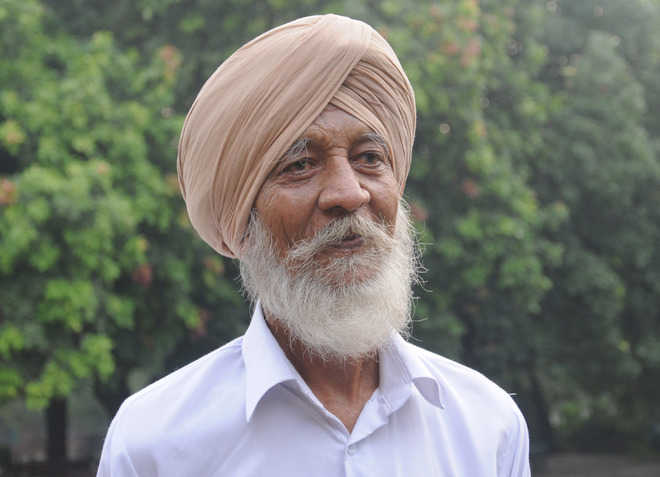Inked in red
Amarjot Kaur
At the auditorium hall of the Museum and Art Gallery, Sector 10, a crowd of 100 odd people (mostly youngsters dressed in kurtas, denims, and Kohlapuri chappals, with gamchas around their necks) marked their attendance at a lecture organised by Lokayat—a people’s movement solidarity group. Talking about ‘50 years of people’s struggle and state violence’, speakers Varvara Rao and Baru Satwarg beguiled an ordinary day with extraordinary tales of courage as they remembered Ghadar Party activist and the key leader of the Lal Communist Party, Baba Bujha Singh.
The event was organised to commemorate Bujha Singh’s death anniversary on Friday.
On banning Paash from textbooks, and Surjit Gag...
Baru Satwarg of Bathinda, a Punjabi progressive writer who has been associated with Krantikari Sabhyachaar Kendra, Inqualabi Lok Morcha, and Pathak Lekh Manch of Malwa, has been writing about Punjab’s social and cultural issues. He is worried sick about the plight of farmers. “Why do they have to commit suicide? They die. Their families ask for relief funds and compensation from the very government that’s responsible for their death! Mustn’t they revolt? They might as well sacrifice their lives for a cause, rather than committing suicide,” he soliloquizes.
With no pacification, he changes the subject and grumbles on. This time, it is about stirring up a cultural revolution that he talks about. His focus is on banning Paash from the NCERT textbooks. “This sort of government control is terrible for a democracy. It’s a hurdle in new and progressive ideas in literature, and a stumbling block in the scientific temperament that is crucial for revolutionary poets and writers—Sab ton khatarnaak hunda hai, supneyan da mar jaana,” he says.
From questioning the aesthetics of Punjab’s culture, especially the songs and films that have become a pompous mouthpiece of casteism as they glorify jatts and promote violence, Satwarg gets stuck when asked about revolutionary poet Surjit Gag.
Gag was recently jailed for hurting religious sentiments as the SGPC alleged that Gag equated himself with Guru Nanak and used derogatory words against the first Sikh master.
“One has to be careful about the words and references they choose while writing. In Gag’s case, it was a poor choice of words. But, as Marx says: religion is the opium of the masses,” he signs off.
A solider with a pen
Varavara Rao, 76, is a communist, activist, Naxalite sympathiser, poet, journalist, literary critic, and public speaker from Telangana. He shares that revolution runs in his blood.
“My brothers were a part of anti-Nizam struggle. Two of my cousin brothers and a sister were freedom fighters. I am essentially a poet-turned-activist. It was a Telegu progressive poet Sri Sri whose works inspired me,” he begins.
As he talks of Bujha Singh, he gives references from Shiv Kumar Batalvi’s poem about Singh and narrates a small one by Lal Singh Dil. Here’s what he likes about Singh: “Even a romantic poet like Shiv Kumar Batalvi wrote a poem Budhe Rukh Nu Fansi in Singh’s honour. He was a people’s person—an English-speaking man, who could sit and talk with poor peasants and make their fight his own. That’s the stuff great men are made of.”
Rao has published fifteen poetry collections of his own besides translating Ngugi wa Thiong’o’s prison diary Detained and novel Devil on the Cross into Telugu. His own prison diary Sahacharulu (1990) was translated into English as Captive Imagination, published by Penguin Books. “A revolution needs two soldiers: one with a gun, other with a pen.”
Remembering Bujha Singh...
Baba Bujha Singh was a symbol of the Naxalite movement in Punjab and one of the leading organisers of the Ghadar Party in Argentina. After returning from Moscow, he joined the Communist Party of India, where he was a prominent figure in the dissident faction that eventually formed the Lal Communist Party in 1948.
He deplored the positions adopted by the 20th Congress of the Communist Party of the Soviet Union held in 1956, labelling the congress as ‘anti-communist’. He argued that the 1956 congress would eventually lead to the disintegration of the Soviet Union. He resumed political activism in the wake of the 1967 Naxalbari uprising. He was arrested on July 28, 1970 and killed in a fake police encounter near Phillaur.









